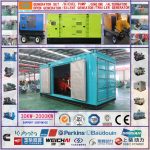Diesel Generators for Load Management A Comprehensive Guide

Introduction
Diesel generators play a crucial role in power generation, especially in situations where there is a need for reliable and continuous power supply. One of the key areas where diesel generators are extensively used is load management. Load management refers to the process of balancing the demand for electricity with the available power supply to ensure efficient and reliable operation of electrical systems. In this article, we will explore the importance of diesel generators in load management, their benefits, applications, and key considerations for selecting the right diesel generator for load management purposes.
Importance of Diesel Generators in Load Management
In today's world, where electricity is a vital resource for various industries, businesses, and households, the need for effective load management has become more critical than ever. Diesel generators offer a reliable and cost-effective solution for managing power demand fluctuations and ensuring uninterrupted power supply during peak periods or in the event of grid failures.
https://www.lkpowerplant.com/160kw-400kw/ of the key advantages of diesel generators in load management is their ability to provide backup power quickly and efficiently. When there is a sudden increase in power demand or a grid outage, diesel generators can be started up within seconds to meet the additional load requirements. This fast response time is crucial for maintaining the stability of electrical systems and preventing disruptions in critical operations.

Diesel generators are also known for their robustness and durability, making them suitable for continuous operation in harsh environments or remote locations. This reliability is essential for load management applications where a consistent power supply is essential for the smooth operation of equipment and machinery.
Furthermore, diesel generators offer fuel efficiency and cost-effectiveness compared to other power generation options, making them a popular choice for load management in various industries. The availability of diesel fuel is widespread, making it easier to refuel generators and ensure continuous operation without relying on the grid.
Applications of Diesel Generators in Load Management
Diesel generators are used in a wide range of applications for load management across different industries and sectors. Some of the common applications include:
1. Industrial Facilities: Industrial plants and manufacturing facilities often rely on diesel generators for load management to ensure uninterrupted power supply for critical processes and equipment. Diesel generators are used to support the main power supply during peak demand periods or as a backup in case of grid failures.
2. Commercial Buildings: Commercial buildings, such as offices, malls, and hotels, use diesel generators for load management to maintain essential services like lighting, HVAC systems, and security systems during power outages. Diesel generators ensure that business operations can continue without disruption, minimizing financial losses due to downtime.
3. Healthcare Facilities: Hospitals and healthcare facilities require a reliable power supply to operate life-saving medical equipment, lighting, and HVAC systems. Diesel generators are crucial for load management in healthcare settings to ensure that critical services are maintained during emergencies or grid failures.
4. Data Centers: Data centers rely on diesel generators for load management to ensure continuous power supply for servers, networking equipment, and cooling systems. In the event of a power outage, diesel generators kick in to prevent data loss and maintain the integrity of information stored on servers.
5. Construction Sites: Construction projects often operate in remote locations where access to the grid is limited. Diesel generators are essential for load management on construction sites to power tools, equipment, and temporary facilities, enabling construction activities to proceed smoothly.
Key Considerations for Selecting a Diesel Generator for Load Management
When choosing a diesel generator for load management purposes, several key considerations should be taken into account to ensure optimal performance and reliability. Some of the important factors to consider include:
1. Power Capacity: The power capacity of the diesel generator should match the load requirements of the electrical systems it will be supporting. It is essential to calculate the total power demand of the connected equipment and appliances to determine the appropriate generator size.
2. Fuel Efficiency: Diesel generators come in various fuel efficiency ratings, and selecting a model with higher fuel efficiency can lead to cost savings in the long run. Look for generators with advanced engine technologies that maximize fuel efficiency while maintaining reliable performance.
3. Emissions Compliance: Diesel generators must comply with environmental regulations regarding emissions of pollutants such as nitrogen oxides (NOx) and particulate matter. Choose generators that meet the necessary emission standards to minimize the environmental impact of operation.
4. Maintenance Requirements: Regular maintenance is crucial for ensuring the reliability and longevity of diesel generators. Consider the maintenance requirements of different generator models, including service intervals, spare parts availability, and service provider support.
5. Noise Levels: Diesel generators can be noisy during operation, which may be a concern in residential areas or noise-sensitive environments. Select generators with soundproof enclosures or mufflers to reduce noise levels and minimize disturbances to surrounding areas.
6. Transfer Switches and Control Systems: An automatic transfer switch (ATS) is essential for seamless transition between the grid and the generator during power outages. Additionally, advanced control systems and monitoring capabilities can enhance the efficiency and reliability of the load management system.
Conclusion
Diesel generators play a vital role in load management by providing backup power, ensuring continuous operation of electrical systems, and maintaining critical services during power outages. Their reliability, fuel efficiency, and cost-effectiveness make them a popular choice for various industries and applications where uninterrupted power supply is essential.
When selecting a diesel generator for load management, it is crucial to consider factors such as power capacity, fuel efficiency, emissions compliance, maintenance requirements, noise levels, and control systems to ensure optimal performance and reliability. By choosing the right diesel generator and implementing an effective load management strategy, businesses and organizations can mitigate the risks associated with power interruptions and maintain operational continuity in the face of unforeseen events.
